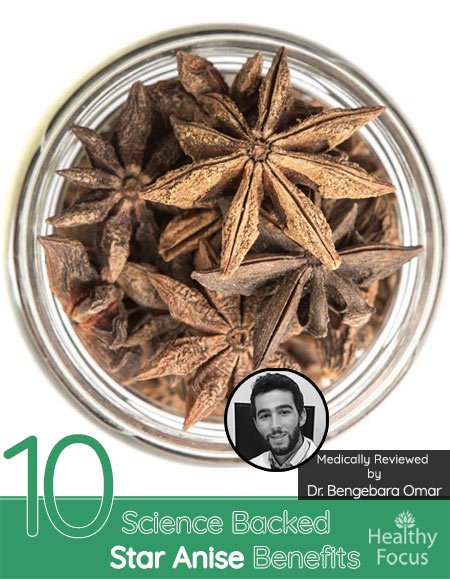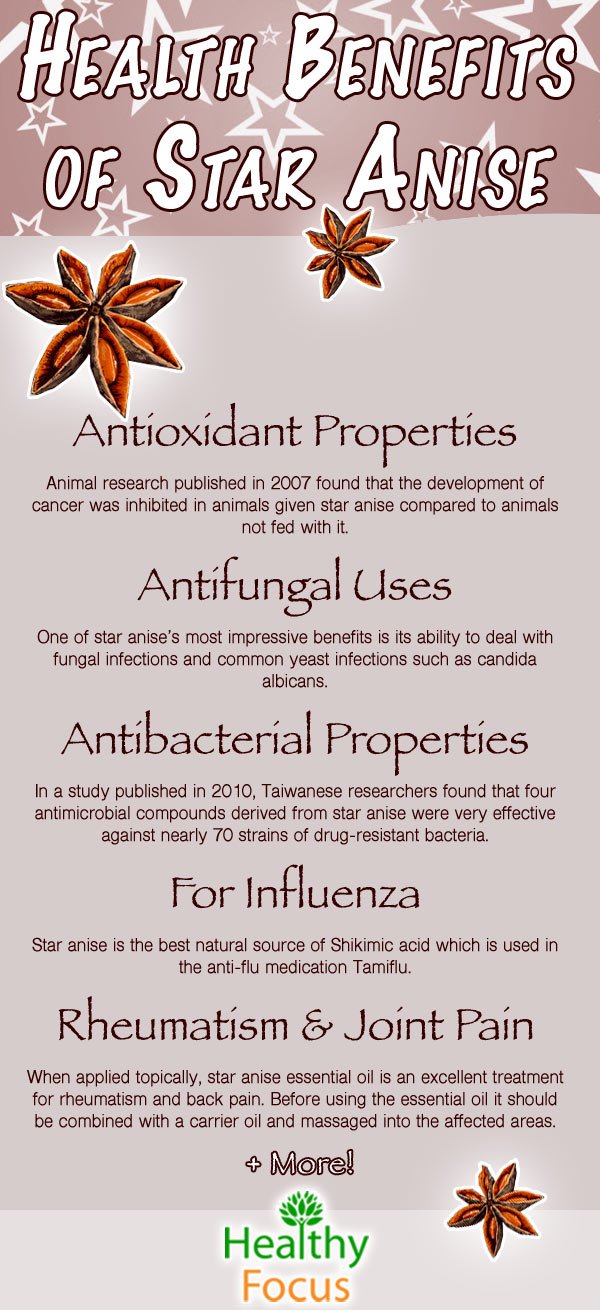Not everybody appreciates the flavor of aniseed or licorice but I must say I am a huge fan. When these flavors come in a package that can also benefit your health I am right behind it. Today, we are looking at a fruit with a wide variety of health benefits from antiviral and antibacterial actions to improving your digestive health and easing the pain of arthritis.
If you are would like to know more about Star Anise Benefits, how to use it and most importantly how it can improve your health, read on.
What is Star Anise?
Star anise is used mainly as a spice but it is also known to have numerous important health benefits. It is a star-shaped fruit belonging to a plant native to China called illicium verum.
Star anise is not related to the European anise plants but it has a similar aniseed or licorice-like flavor. It can be used in cooking as a spice or drunk as a tea. It is important to note that you should only use the Chinese variety as there are concerns regarding the toxicity of Japanese star anise.
Star anise contains plenty of important minerals and vitamins including Vitamins A and C as well as small amounts of B vitamins. It also contains calcium and phosphorus but in terms of its medicinal value, perhaps its most important compound is shikimic acid.
Shikimic acid is used as an ingredient in Tamiflu – the influenza medication which has also been used in the battle against swine flu.
Star Anise Facts
- The star anise tree reaches a height of around 45 feet.
- The fruit is a star-shaped pod consisting of between six and ten segments.
- Despite its name, the fruit is not related to anise. However, both anise and star anise contains anethole which gives the spices their distinctive aniseed flavor.
- Star anise has been an important ingredient in Asian cuisine for centuries. Today, it is often used in spice mixtures including garam masala in India and Chinese five spice powder.
- Star anise is an ingredient in various alcoholic drinks including ouzo, sambuca, absinthe, and anisette.
Health Benefits of Star Anise
1) Antioxidant Properties
It is essential that we get as many natural antioxidants into our bodies as possible and star anise is an excellent source of antioxidants thanks to the presence of linalool and Vitamin C. The reason that we need antioxidants is that they help protect us from cellular damage which is caused by exposure to free radicals and environmental toxins.
These free radicals can cause premature aging, as well as putting you in more danger of serious disease like heart disease or cancer.
Animal research published in 2007 found that the development of cancer was inhibited in animals given star anise compared to animals not fed with it. (1) While this early research is promising, the researcher pointed out that more research on humans was necessary before we could be sure of its potential for humans.
2) Antifungal Uses
One of star anise’s most impressive benefits is its ability to deal with fungal infections and common yeast infections such as candida albicans. Candida is a naturally occurring fungus which is found in the throat, mouth, intestines, and genitals.
This yeast usually causes no problems but unfortunately, the balance of microbes can become disturbed when your immune system is weakened for some reason. When this occurs, a candida overgrowth occurs leading to a serious infection called candidiasis.
The potentially good news is that researchers in South Korea have demonstrated that star anise extracts and essential oils derived from the plant exhibit excellent antifungal properties in relation to Candida albicans.
The study which was published in 2010 led researchers to conclude that star anise extract was a promising antifungal treatment that could have future use in the fight against Candida. (2)
3) Antibacterial Properties
Recent years have seen an increase in bacterial which exhibit increasing resistance to commonly prescribed antibiotics. This crisis has created the incentive for scientists to find new and more effective antimicrobial treatments and the search is well and truly underway.
The antibacterial abilities of many natural herbs and plants have been put under the microscope and researchers have already begun to see the antibacterial potential of star anise.
In a study published in 2010, Taiwanese researchers found that four antimicrobial compounds derived from star anise were very effective against nearly 70 strains of drug-resistant bacteria. (3) This led researchers to conclude that the compounds in star anise could be developed as an antibiotic in future.
4) For Influenza
Star anise is the best natural source of Shikimic acid which is used in the anti-flu medication Tamiflu. Shikimic acid is rare in nature-it is present in sweetgum fruit and ginkgo but occurs in far greater concentrations in star anise.
An Italian study published in 2011 examined the effects of Shikimic acid on the immune system to ward of flu as well as other viral infection. They found that while shikimic acid alone had little effect on the immune system it had a significant effect when combined with small amounts of the plant antioxidant- quercetin (4).
The effect of shikimic acid combined with quercetin was to boost immune function and help protect the body against viral infections such as the flu.
5) Rheumatism and Joint Pain
When applied topically, star anise essential oil is an excellent treatment for rheumatism and back pain. Before using the essential oil it should be combined with a carrier oil and massaged into the affected areas.
6) Improved Digestion
Star anise is often prepared as a tea especially in South East Asian countries and China. It is mainly used to deal with a variety of digestive complaints such as gas, abdominal cramps, indigestion, bloating and constipation. To treat any digestive condition that you may be suffering from, it is considered best to drink the tea after your meals.
7) Women’s Health
Star anise has traditionally been used in China to help women during pregnancy and to new mothers wanting to increase their milk production. Traditional Chinese practitioners often prescribe it for pregnant women.
It is used to bolster their immune system and stave off illness during this important time. Researchers have also found that star anise had an estrogenic effect owing to a compound called anethole which helps to modulate hormonal functions in women.
8) Sleep Disorders
According to traditional use and anecdotal evidence, star anise may have mild sedative properties which can help your nerves to settle down and also ensure a good night’s sleep. If you are having difficulty getting to sleep, try a cup of soothing star anise tea before going to bed.
9) Coughs
Star anise tea is an excellent natural remedy to ease a cough and soothe your sore throat. Simply follow the tea instructions below and drink up to three times each day.
Alternatively, you can get instant relief from your symptoms by inhaling the star anise’s seeds. The best way to do this is to put 2 teaspoons of ground up seeds into a large cup or a mug and add boiling water. Cover your head and shoulders with a towel and place your face over the mug. This will create a soothing steam inhalation that should relieve your cough and clear your stuffiness in no time at all.
Star anise is also an effective remedy for a number of other respiratory conditions including bronchitis and may even provide relief from asthma.
10) Fresh Smelling Breath
Star anise is often used by people in Pakistan and India to help keep their breath smelling clean and fresh. Many people chew on the seeds after a meal to neutralize the smell of their food. Because star anise has excellent antibacterial properties, it may also contribute to your oral health in general.
You could even make a natural mouthwash by adding a teaspoon of ground star anise seeds to a few cups of water. You could add mouth friendly clove oil or peppermint oil to the mix for even greater effect.
How to use Star Anise
If you would like to start reaping the benefits of star anise there are several ways to incorporate it into your healthy diet. It can be added to your meals as a spice or made into a tea.
As a cooking spice
Star anise can be found as one of five spices used in Chinese 5 spice powder. You can make your own delicious five spice powder by grinding your star anise and mixing it with the other 4 spices – cloves, fennel seeds, cinnamon and Sichuan pepper.
When used alone, star anise is used to sweeten and flavor soups, stews, and various other dishes. Be careful not to use too much as the unmistakable flavor can become overpowering. A piece or two should be sufficient or you can use a pinch or two of powdered star anise instead.
Star anise is also regularly used as an ingredient in sweet dishes like puddings and pastries. Be adventurous and experiment a bit if you enjoy the flavor.
Star Anise Tea
Star anise is often used to make a soothing and healing tea. Star anise tea is an excellent remedy for various digestive issues, coughs, and sore throats. It is usually made with the seeds.
To make star anise tea follow these simple instructions:
- Boil your water and pour it into a teapot.
- Add 2 whole star anise seed pods for each cup of water then allow it to seep for up to 15 minutes.
- Strain the tea into a cup and add some honey to taste.
- Drink after each meal if you are trying to deal with a digestive problem or a cough.
How to Select and Store Star Anise
You should be able to find star anise in the ground or whole forms at the spice markets or health food stores. If you choose the whole anise seed pods in your cooking, you may find the flavor obtrusive and remember the pods themselves are inedible. The best way to use whole pods is by simmering them in soups, marinades or sauces and removing them before you serve the dish.
Ground star anise is easier to cook with, but its flavor tends to diminish much faster.
Whether you are using ground or whole star anise, you should store it in an airtight container and put it in a cool, dry area of the house. The whole pods should stay fresh and usable for at least a year while the ground version will lose its flavor after around six months.
Warning regarding Japanese Star anise
The FDA recently issued a warning regarding the consumption of star anise teas. It is important to note that there are different varieties of star anise and that while Chinese star anise is regarded safe, Japanese star anise contains a toxic compound called sikimitoxin.
The problem is that once the star anise is dried, there is no way to tell the difference between the Chinese and Japanese versions of the spice and the FDA have warned people to take care.
Reported side effects of Japanese star anise include nausea. Vomiting, seizures, restless jitters and rapid eye movement.
If you experience any of these side effects, throw away the tea immediately and see your doctor.
Other Star Anise Side Effects and Precautions
- Despite its traditional use for pregnant and lactating women, it is potentially unsafe for use for new and expectant mothers and should be avoided unless under your doctor’s supervision.
- Because of its estrogenic properties, star anise tea should not be drunk by people with ovarian, breast or uterine cancer.
Amazon Options for Star Anise
(1) http://www.ncbi.nlm.nih.gov/pubmed/17658503
(2) http://www.komci.org/GSResult.php?RID=0075KJMM%2F2010.15.4.157&DT=6
(3) http://online.liebertpub.com/doi/abs/10.1089/jmf.2010.1086
(4) http://www.ncbi.nlm.nih.gov/pubmed/18297698



Leave a Reply
You must be logged in to post a comment.